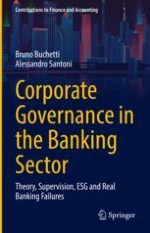2022 | OriginalPaper | Buchkapitel
5. Corporate Governance and Behavioral Finance
verfasst von : Bruno Buchetti, Alessandro Santoni
Erschienen in: Corporate Governance in the Banking Sector
Aktivieren Sie unsere intelligente Suche, um passende Fachinhalte oder Patente zu finden.
Wählen Sie Textabschnitte aus um mit Künstlicher Intelligenz passenden Patente zu finden. powered by
Markieren Sie Textabschnitte, um KI-gestützt weitere passende Inhalte zu finden. powered by
